Ever since Three Parts Dead hit stands, yikes, ten years ago, fans and friends of the Craft novels have asked—how can we game here? Something about this post-industrial fantasy world of dead gods with shareholder’s committees, lich king CEOs, and transcontinental dragons, rife with adventure hooks and imminent catastrophe, makes folks itch to roll up their own PCs. I’ve never found the perfect system for a Craftworld TTRPG, but I’ve tired a few, and considered more.
A few challenges present themselves. First, characters in the Craft books have a wide range of power levels, from engineer-priests and accountants to deicidal wizards. The ideal system would allow for that range, without making players feel sidelined–a system in which Hawkeye can have as much impact on the narrative as Thor, even though one of them is a posthuman techno-god and the other is a guy with a Neolithic stick-string contraption.
Buy the Book


Dead Country
Second, the “magic system.” The Craft world is suffused with magic–everything from rocks to gods emerges from the organization of soul-stuff. The Craft is the power to say what the world is, and to argue it otherwise. To persuade rocks to fly and oceans to freeze, to bargain for souls and call in the debts of gods. Individual workers of the Craft work a lot like lawyers–magical duels seek flaws in reasoning, clauses in contracts. There are analogues to ‘spells,’ ranging from boilerplate glyphwork to elaborate thousand-page edifices of Craftwork reasoning, but a Craftswoman can also think on her feet–though she’s not at her strongest when she does so. It’s tricky to find a system with the right mix of structure and play–where your own arguments become vectors for attack. And that’s just Craftwork! I haven’t even touched on theology…
At any rate, here’s what I’ve come up with. If you want to bring the Craft to your table, you could start with one of these options—or use them as a springboard for your own homebrew adventures (and then tell me about them!).
Mythender
Kicking things off with an oddball rec! Mythender is not a game meant to simulate the core action of a Craft Sequence novel–though it is a game entirely about action, in another sense. It is not social, it is not campaign-oriented, it is not even slightly chill. Mythender is a heavy-metal album cover-like wonderland about killing gods by rolling a lot of six sided dice. Like, multiple gameshop cubes of 12mm dice. Your heroes, in the base game, are humans whose lives have been destroyed by the gods. Now, they’re going to destroy some gods back. Mythender is meant for play with (and against) recognizable mythological figures like Zeus or Thor—or for that matter Santa Claus—but if you want to play Deathless Kings in the God Wars, with that technicolor feedback explosion of reality vibe, this is your game. Mythender won’t give you the intricacy of a Craftwork battle, or the boots-on-the-ground awfulness of an average God Wars soldier’s experience, but if you want to feel like the King in Red in full cackle, it’s worth a try. (Or just set up all your action figures and stomp on them wearing combat boots. I won’t tell anyone.)
Vanilla Pathfinder / D&D
The Craft world has (rough) analogues to most of the core role-playing classes and categories—you could reskin a wizard or a sorceress as a Craftswoman, a paladin as an Eagle Knight, you could just straight up let a player play a gargoyle—and it almost works, but it feels a bit like monster-truck rallying in a race car, or vice versa. Player’s expectations when they pick up a third level character sheet and a handful of polyhedrons are so tuned that it’s hard to convince them to do anything other than Player Character Stuff: bash down the door, sing a slaying song, Grayhawk the bodies, not exactly the stuff of investigation, mystery-solving, or even subtlety. The balance issue rears its head again: a ‘party’ in a Craft game might well contain a reality-shattering wizard, a gargoyle priest, and a forensic accountant—tricky to build in murder hobo games, which are often tuned for role protection and party balance. (Though maybe she’s actually a reality-shattering forensic accountant… hold up, I have to write my editor…)
Also, it’s hard to represent soulstuff (which powers the Craft) in these games—the rules’ approach to magic doesn’t involve a physical cost for most spells, or a ‘pool’ of sorcerous power as such.
Gumshoe
Gumshoe a great approach to the question of how do you run a mystery game, and since ‘something’s happening here / what it is ain’t exactly clear’ (as the man says) is one of the core narrative beats in the Craft Sequence, it has my attention. I’m fascinated by the separation of investigative abilities (used for tasks where failure isn’t narratively interesting, like finding a clue vs. not) and general abilities (used where failure has a narratively interesting consequence), and the use of a pool system to drive health, morale, and general abilities gives a lot of room to hack in a soulstuff economy based off of trading pool points to drive sorcery. Swords of the Serpentine, the Gumshoe swords & sorcery system by Kevin Kulp and Emily Dressner, came out post-pandemic and I haven’t been able to get a table together yet, but there’s a lot here for a Craft game. (Though the Sorcery ability is a bit Mysterious and Wibblywobbly for use as Craft without a tiny bit of rule hacking, it’s perfectly suited for the design goal, to represent ominous and terrifying sorcery in a Conan/Fafhrd and the Gray Mouser/Lies of Locke Lamora context.)
Cypher System
The Cypher System and its cousins use three-stat action pools to represent characters’ stamina/HP as well as their ability to do narratively interesting things. Add a trading/contracting mechanic and you’re quite close to representing soulstuff in the Craft Sequence. My main hangup on Cypher system for Craft is that the three core stats are Intellect, Might, and Speed—“Intellect” covers a lot of ground, representing basically all social and mental abilities, and seems less useful for a game meant to include bankers and wizards and engineers and con artists and academics and so on. But you could probably represent the experience of a firm of Craftsfolk reasonably well using a hacked version of Invisible Sun—the system where Everyone Is a Wizard! And Also It Comes With A Menacing Lich Hand.
Shadowrun
Shadowrun the setting is wacky enough for the Craft Sequence. Troll investment bankers! Dragon talk show hosts! And Shadowrun does allow the player to pick up whole fistfuls of dice every now and then, which is a lot of fun. The main drawback is actually the angle of Shadowrun games. I’ve heard the Craft books described as fantasy cyberpunk, which I dig—but the books are as likely to take place inside the power structures of the world as they are in the dark alleys beyond. There is a Shadowrun-analogue magic crimes aspect to the Craft world, of course. We just haven’t seen much of it. Yet.
Watch the skies.
Deadlands
Well. Look. It’s not a great fit, tonally or mechanically. But: in Dead Country, Tara does wear a cowboy hat.
Hugo-, Nebula-, and Locus Award winning author Max Gladstone has been thrown from a horse in Mongolia and once wrecked a bicycle in Angkor Wat. He is the author of many books, including Empress of Forever, the Craft Sequence of fantasy novels, and, with Amal El-Mohtar, the internationally bestselling This is How You Lose the Time War. His dreams are much nicer than you’d expect.











No love for the Catastrophists?
GURPS should work, especially if you use some of the alternative magic systems.
Yeah, seconding GURPS. It’s great for having options for lots of different character types who all have ways to shine and different capabilities, the Ritual Path Magic system could be easily adapted to the Craft, with a parallel but overlapping system for the clerics and gods.
I’m not much of a gamer, so thank you for introducing me to the delightful phrase “murder hobo”. Also and of course, thanks for the Craft Sequence. I loved the latest installment and can’t wait to see what happens next!
I’m re-reading the Craft Cycle (just finished Last First Snow) in prep for reading the newest book and I’ve also been playing Blades in the Dark which strikes me as a likely candidate for the bones of a Craft Cycle RPG. I’d be very curious if Max Gladstone has looked into it/tried it out! In particular, Blades excels at urban intrigue (which is a key part of the Craft Cycle feel to me – each book takes place in a very present and distinct city, much like Blades‘s default setting of Doskvol). Things are a bit more dystopic in Blades but that could be handled easily. And the “move” system allows for a lot of narrative flexibility (you could imagine a “Craft”-based class with special moves, a Priest-based class, etc. as well as everyone having an ability that corresponds to using the Craft or Applied Theology). Scores in Blades also involve a lot of the things you see in Craft Cycle books: evading or beating up the magic-y cops, finding and distributing hidden information about politics or the world, fomenting or stopping local insurrections, etc. And inequality is a huge theme for both as well.
Urg, typo, should have written “Craft Sequence” not “Craft Cycle”.
Also, it turns out someone tried this idea out in 2016!
“Laws of the Dark”
I love these TTRPG articles. I bet there’s a good PbtA hack out there for this. The way games like Avatar and Masks interact with magic powers shows how adept the game style is at handling complex magic systems smoothly and allowing a balance of magic-users and mundane heroics.
Really cool article. As of yet, I’ve only read “Three Parts Dead”, and I’m not sure if it quite clicked with me as a novel, but as an RPG setting, it sounds really great. Gumshoe would make a lot of sense, but so would a ton of other systems … I just wonder how Max Gladstone would feel about being approached by a publisher wanting to do a Craft RPG. There seems to be a renewed interest in adapting novel worlds as RPG settings – there’s an Expanse RPG (based in the novels, not the streaming series) and an upcoming Fifth Season RPG (both by Green Ronin, who also did a Song of Ice & Fire RPG), there’s Chaosium’s new Rivers of London RPG, the Dresden Files RPG by Evil Hat, Modiphius’ new Dune RPG … would be cool to see something like this happen!
Max, please, it’s Contractpunk.
Honestly, for the physical cost, Shadowrun is probably one of the best matches. Though spells don’t line up as nicely with Craftwork as I would like…
I also think of the rather under-written and insufficiently utilized epic magic syatem in D&D 3e, where you start with a “spell seed” and then perform a number of permutations and adjustments of cost and method to make it work.
I’ve actually been dying for years to translate the Craft Sequence setting to Godbound, because I think it could really work! Godbound characters get power from their followers belief (or ambient faith energy if they choose not to have a cult), which works for the Gods part of the setting, but there’s also Sorcery that could be finagled into Craft.
I just don’t personally have the wherewithal to do setting crafting but if someone ever does, try Godbound!